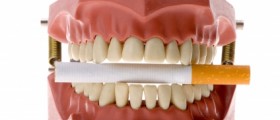
Esophageal cancer is a malignancy that affects esophagus – an organ in the shape of a muscular tube through which food passes from the pharynx to the stomach. This organ has such an important role in nutrition that its name literally translates as "entrance for eating." People suffering from esophageal cancer are often having a lot of troubles with normal breathing and eating, and they are at the high risk of aspiration pneumonia, which occurs when some foreign materials enter the bronchial tree. These materials may even be food, saliva, or nasal secretions, since people with esophageal cancer often lose otherwise normal ability to eat, drink and swallow.
Causes of esophageal cancer
Esophageal cancer is relatively rare form of cancer and only about 15,560 new cases of this disease are diagnosed in the United States each year. Like any other kind of cancer, esophageal cancer is not associated with any single cause. It rather occurs from combination of various factors of which the age and gender play the most prominent role.
Only in the United States, the median age for esophageal cancer diagnosis is 67 years. As people grow older, they are at the increased risk of this disease. Males seem to be more affected than females, and people who have family history if this disease is generally considered belonging to a high-risk group. However, one of the risk factors stands even more prominent among the others – tobacco smoking.
Smoking and esophageal cancer
People who smoke are at severely increased risk of esophageal cancer. Cigarette smoke is actually a cocktail of over 4000 chemical, of which 43 are known cancer-causing agents. Tobacco smoking is even more hazardous in combination with heavy alcohol intake. It seems that consuming cigarettes and alcohol together dramatically increases the risk and makes cigarette smoking even more hazardous than if it is enjoyed individually.
According to some scientific findings, tobacco and alcohol account for about 90 percent of all esophageal squamous cell carcinomas. However, smoking not only causes esophageal cancer but also increases the risk of many other cancers including those in the larynx, voice box, upper throat and also pharynx, liver, abdominal, pancreas, mouth, nasal area, kidney, cervix and bladder and as well several forms of leukemia.
People who have family history of cancers should avoid smoking to increase their chances of survival, as well as older individuals. Esophageal cancer risk is one out of one hundred and twenty five persons over 75 years old, but there is also evidence that eight times more vulnerable to various types of cancers.

















Your thoughts on this
Loading...